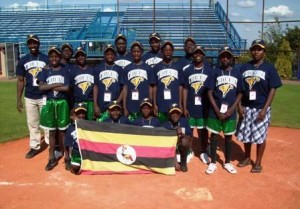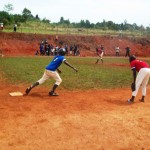
In the African country of Uganda, there are two million orphans. Nearly half of the children have lost their parents from AIDS, a terrible and widespread disease.
Many children are very poor. Many live in slums.
However, some children in Uganda have found something great that helps them in their lives: playing baseball.
Uganda’s Little League team is very good. So good, in fact, that last year they beat the team that had held the regional championship for 11 years, Saudi Arabia.
It was the first time that an African team had won the regional tournament.
They rose to the top, even though they don’t have the equipment and groomed fields that many other children have. In fact, in Uganda 15,000 Little Leaguers have to share just 700 baseball gloves.
They fought their way to the top, in spite of the fact that some of the baseball players are very poor. One of them, Matovu Ivan, the team’s starting pitcher, lives with his family in an equipment shed on the ball field. He said that when he goes to sleep, he dreams of baseball. He dreams he is a pitcher for the Yankees.
Some other members of the team, who are aged 11 to 13, live in slums or work in the streets.
In spite of those odds, the Ugandan children beat the Saudi Arabian team.

That win qualified them to move on to the Little League World Series to be held in Pennsylvania last August. It was the first time in history that an African team had qualified for the Little League World Series.
The team applied for Visas, a document needed for travel to the United States.
However, the U.S. embassy told the team they couldn’t have Visas. They said there were “discrepancies” in the children’s documents.
It is most likely that the problem was with the children’s birth certificates.
In Uganda, most people don’t have birth certificates. Many of the children don’t have parents to care for them and take care of important documents like birth certificates. Also, many children are not born in hospitals, where they would receive a birth certificate.
Without Visas, the Ugandan team was not able to go to Pennsylvania to compete in the Little League World Series.
The first team the Ugandans were to play at that tournament was the Canadian team from Vancouver.
When the Canadians found out the Ugandan team couldn’t come to the U.S., they wanted to do something. With help from an organization called Right To Play, they raised more than $130,000. They used some of that money to travel to Africa, to play the Ugandan team and give them the game that was rightfully theirs; the game the Ugandans had fought hard for; the opportunity they had earned.
On Jan. 17, the Canadian and the Ugandan Little Leaguers played in front of 300 spectators. It wasn’t the 20,000-strong crowd that would have been in Pennsylvania, but this game was far more significant. And, because of how it came about, it has been covered by the media in countries around the world including ESPN and The New York Times.
Uganda won the game, two to one.
George Mukhobe is the head coach of the Ugandan team. He said he was glad the Canadians could come to Uganda, so other people could see the challenges faced by the players there.
Some of the money raised will go to help educate the children on the Ugandan team.
“One thing that most people recognize is that children all over the world are basically the same,” said Richard Stanley, U.S. co-ordinator for Uganada Little League Baseball. “They all want the opportunity to participate in competitive games against each other. The only difference is that some children are blessed with more things to play with than others… no matter their financial status, they all enjoy playing with each other. I believe that was proven once again when the Canadian kids came and played against the Ugandan kids.”
Visit the Uganda Little League Baseball website here. Be sure to scroll to the bottom of the website to watch a very moving excerpt from an upcoming documentary about the Ugandan baseball players.
CURRICULUM CONNECTIONS
By Kathleen Tilly
Writing/Discussion Prompt
What do you think life is like for many of the Ugandan players? Read the text carefully in order to find out information to support your thinking.
How do you think their lives are similar and/or different from yours? Record your ideas on a t-chart and discuss these observations with a partner.
Reading Prompt: Making inferences/interpreting texts
Do you think the Canadians felt bad about losing the game? Why or why not?
Junior
Use stated and implied ideas in texts to make inferences and construct meaning (OME, Reading: 1.5).
Intermediate
Develop and explain interpretations of increasingly complex or difficult texts using stated and implied ideas from the texts to support their interpretations (OME, Reading: 1.5).
Grammar Feature: Simple and Complex Sentences
Sentences that are short are called simple sentences. An example from the article is: “Many children are very poor.”
A complex sentence is longer and often contains more than one idea. An example from the article is: “They used some of that money to travel to Africa, to play the Ugandan team and give them the game that was rightfully theirs; the game the Ugandans had fought hard for; the opportunity they had earned.”
Do you change your reading behaviour when you read a simple versus a complex sentence? How?
Why do you think the journalist, Joyce Grant, chose to write using different types of sentences?







